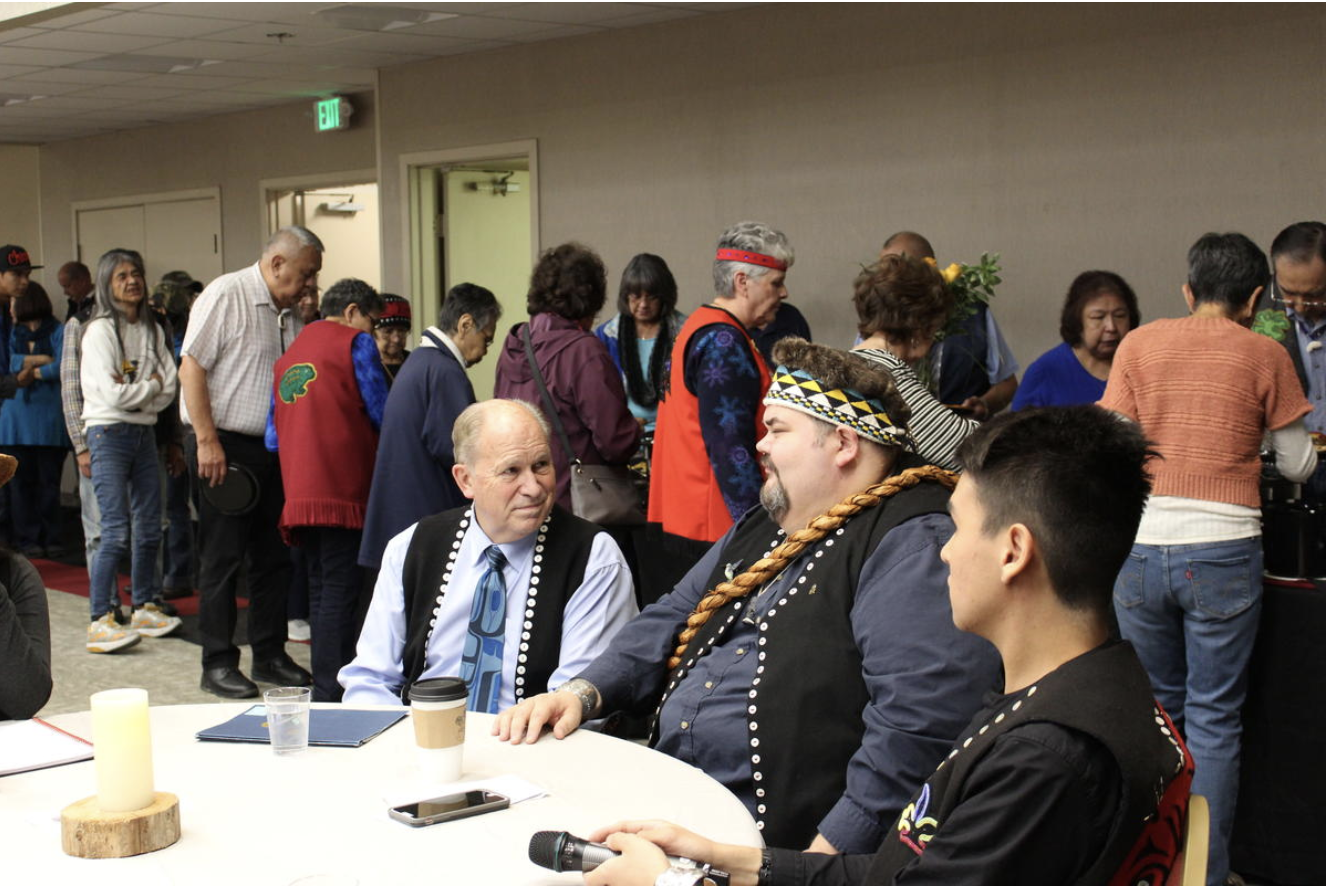
- Details
- By Lyndsey Brollini - KTOO
This story was originally published by KNBA on December 15, 2021. Read the original story at KNBA. Republished by Native News Online with permission.
At this year’s Alaska Federation of Natives convention, sponsors of a ballot initiative took the opportunity to say their piece on why Tribal recognition in the state is long overdue.
Multiple attempts to pass a bill through the Legislature have been unsuccessful. This year, a Tribal recognition bill was passed in the House but never went to a vote in the Senate.
Want more Native News? Get the free daily newsletter today.
Chalyee Éesh Richard Peterson is the president of the Central Council of the Tlingit and Haida Indian Tribes of Alaska. He’s also one of the initiative’s sponsors.
“A bill that did come forward from Rep. Tiffany Zulkosky to recognize Tribes couldn’t make it because they were unable to really just get their business done,” Peterson said. “We thought it was better to just, let’s put this in the hands of the people.”
The initiative wouldn’t give Tribes any new powers because they are inherently sovereign. Instead, the initiative aims to have the state acknowledge that sovereignty.
Co-sponsor La quen náay Liz Medicine Crow said the relationship between the state and Tribes needs to be solidified into law — otherwise Tribes are caught in the middle of the politics of the current administration.
“The state of Alaska has too often used our Native communities and our Tribes as a political hot potato,” Medicine Crow said.
The state and Alaska Native Tribes already work together in a government-to-government capacity with Tribal compacts.
The state has a compact in child welfare that allows Tribes to take charge in providing their own child welfare services. And earlier during the AFN conference, Gov. Mike Dunleavey spoke about creating Tribal compacts in education.
“I was very excited to hear that Governor Dunleavy is supportive of a government-to-government relationship with Tribes,” Medicine Crow said. “That’s what this ballot initiative concretes and puts into law, we need to have that in order so that it is not just formal, but it is forever.”
To make it on next year’s ballot, the initiative needs over 36,000 signatures within a year after being approved. Two months in, over a third of those signatures have already been gathered.
More Stories Like This
50 Years of Self-Determination: How a Landmark Act Empowered Tribal Sovereignty and Transformed Federal-Tribal RelationsFond du Lac Band of Lake Superior Chippewa Signs Cannabis Compact with State of Minnesota
Chickasaw Hall of Fame Nominations Now Accepted
Navajo Nation Council Approves Historic Legislation to Strengthen Veterans’ Representation
Navajo Nation Council to Convene 2025 Fall Session Amid Budget Cuts and Calls for Accountability
Help us tell the stories that could save Native languages and food traditions
At a critical moment for Indian Country, Native News Online is embarking on our most ambitious reporting project yet: "Cultivating Culture," a three-year investigation into two forces shaping Native community survival—food sovereignty and language revitalization.
The devastating impact of COVID-19 accelerated the loss of Native elders and with them, irreplaceable cultural knowledge. Yet across tribal communities, innovative leaders are fighting back, reclaiming traditional food systems and breathing new life into Native languages. These aren't just cultural preservation efforts—they're powerful pathways to community health, healing, and resilience.
Our dedicated reporting team will spend three years documenting these stories through on-the-ground reporting in 18 tribal communities, producing over 200 in-depth stories, 18 podcast episodes, and multimedia content that amplifies Indigenous voices. We'll show policymakers, funders, and allies how cultural restoration directly impacts physical and mental wellness while celebrating successful models of sovereignty and self-determination.
This isn't corporate media parachuting into Indian Country for a quick story. This is sustained, relationship-based journalism by Native reporters who understand these communities. It's "Warrior Journalism"—fearless reporting that serves the 5.5 million readers who depend on us for news that mainstream media often ignores.
We need your help right now. While we've secured partial funding, we're still $450,000 short of our three-year budget. Our immediate goal is $25,000 this month to keep this critical work moving forward—funding reporter salaries, travel to remote communities, photography, and the deep reporting these stories deserve.
Every dollar directly supports Indigenous journalists telling Indigenous stories. Whether it's $5 or $50, your contribution ensures these vital narratives of resilience, innovation, and hope don't disappear into silence.
 The stakes couldn't be higher. Native languages are being lost at an alarming rate. Food insecurity plagues many tribal communities. But solutions are emerging, and these stories need to be told.
The stakes couldn't be higher. Native languages are being lost at an alarming rate. Food insecurity plagues many tribal communities. But solutions are emerging, and these stories need to be told.
Support independent Native journalism. Fund the stories that matter.
Levi Rickert (Potawatomi), Editor & Publisher
